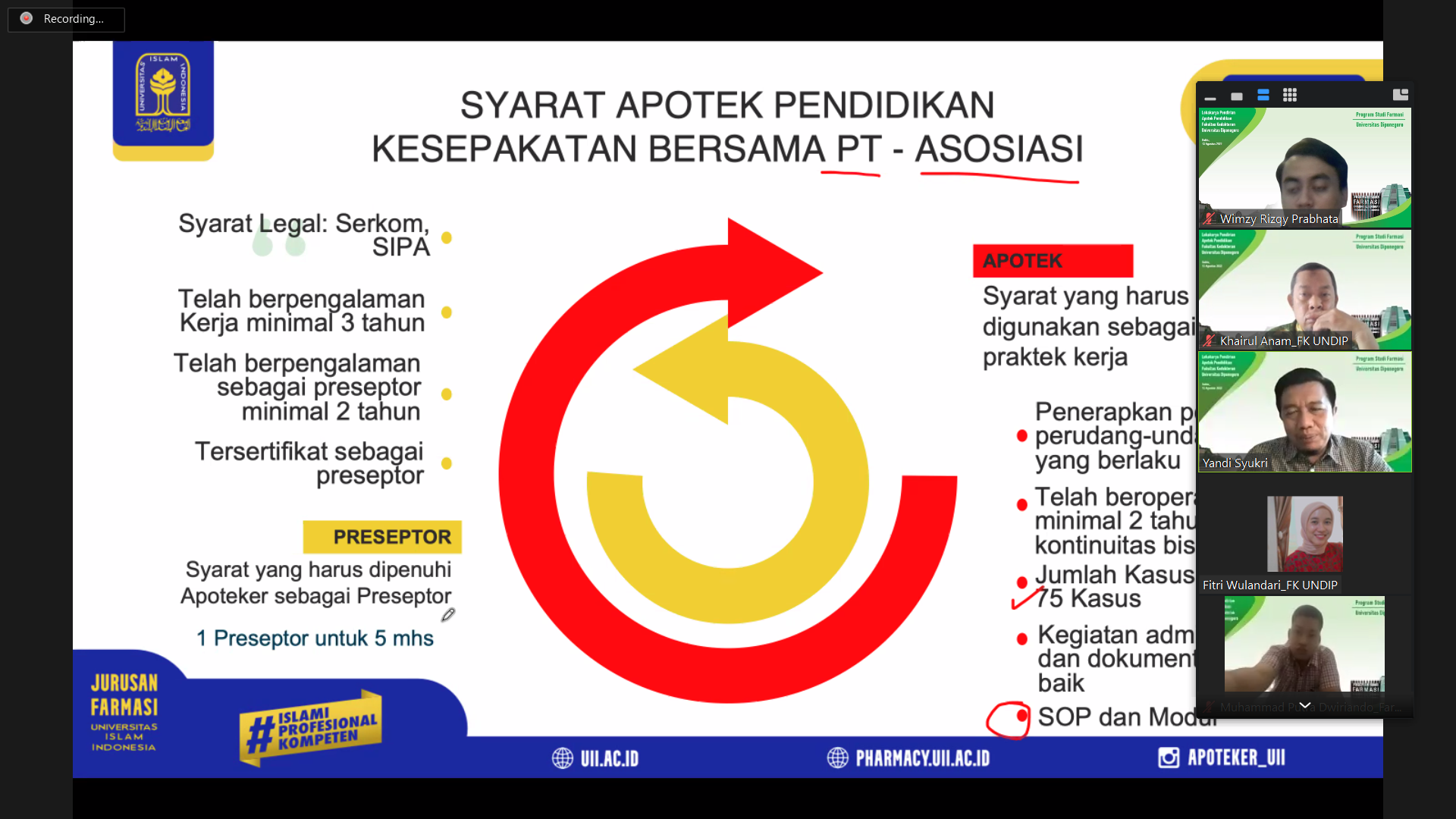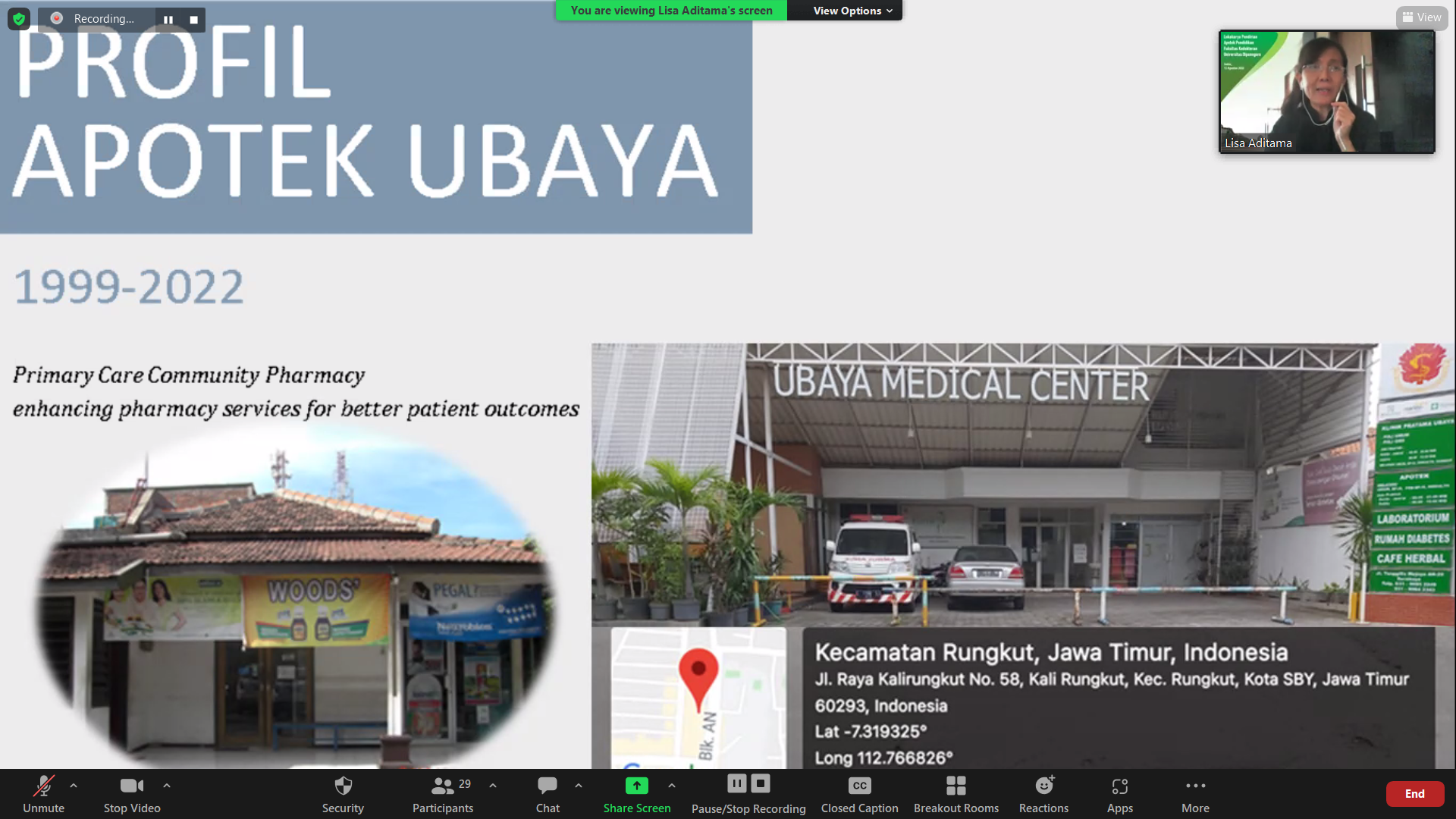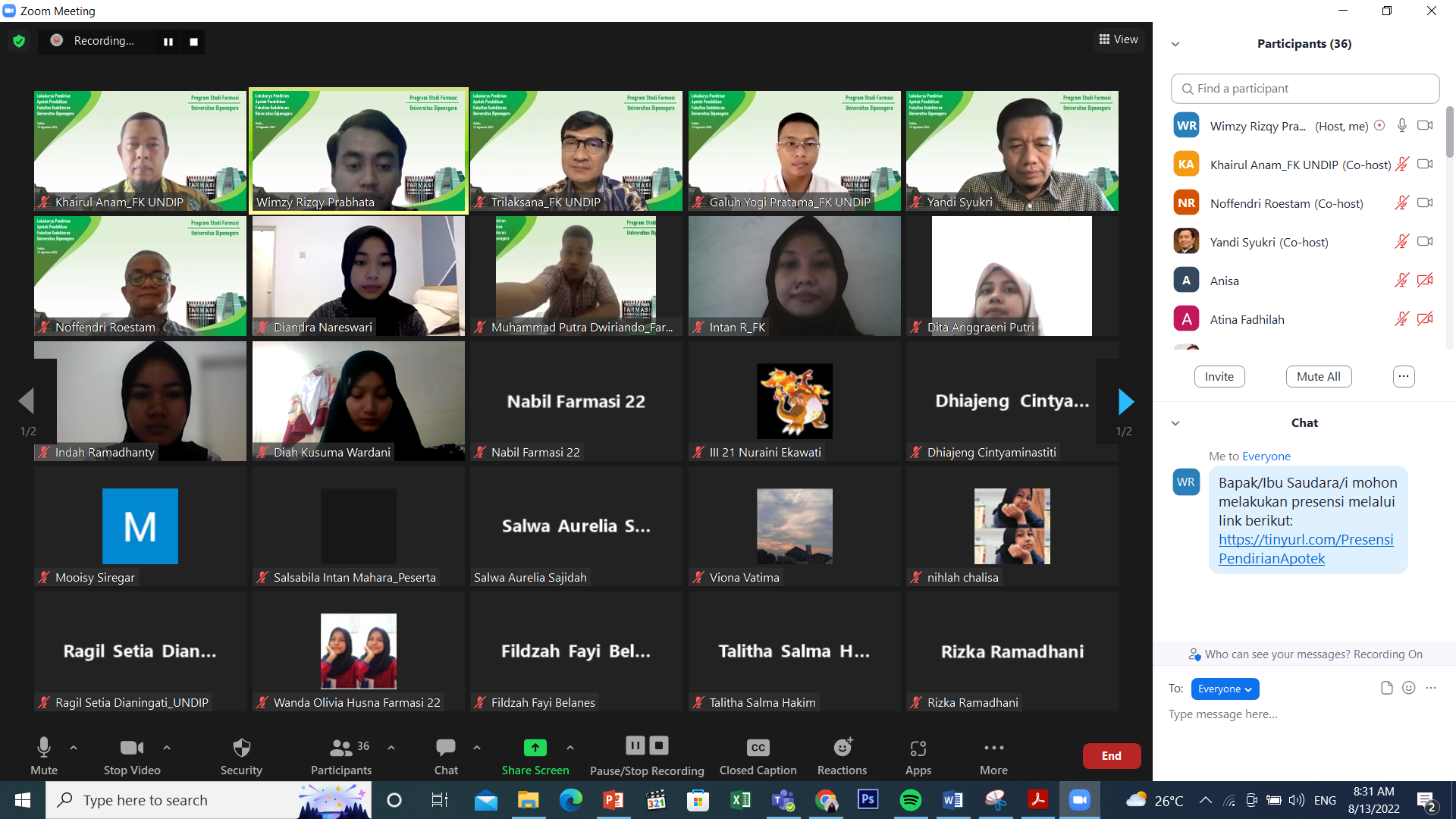The Pharmacy Study Program of Faculty of Medicine Undip held a workshop on the establishment of educational pharmacies on Saturday, August 13th 2022 online as a strategy and the first step in establishing the Pharmacist Professional Study Program (PSPA) of Faculty of Medicine Undip. This workshop activity was carried out to initiate the establishment of educational pharmacies as an educational vehicle in preparing prospective pharmacists within the Faculty of Medicine Undip. This workshop was filled by three speakers including: “Prof. Dr. apt. Yandi Syukri, M.Si.” who is a representative of the Indonesian Pharmacy Higher Education Association (APTFI); “apt. Noffendri Roestam, S.Si”, as Secretary General of IAI; and “Dr. apt. Lisa Aditama, S.Si., M.Farm.Klin”, as a Pharmacy Management Pharmacist from the University of Surabaya.
Prof. Dr. apt. Yandi Syukri, M.Si. opened a material related to “The Importance of Educational Pharmacies as a Learning Vehicle for Prospective Pharmacists”. According to Prof. Yandi, educational pharmacy is important to be established with the aim of meeting the learning outcomes of graduates formulated in the KKNI and the competency standards of Indonesian pharmacists. Graduate learning outcomes (CPL) that can be supported from the establishment of educational pharmacies include: knowledge CPL, general skills CPL, specific skills CPL. Because practice is the largest proportion in the pharmacist profession study program, PSPA students must be facilitated for professional practice, especially in educational pharmacies. According to Prof. Yandi, in general, educational pharmacies are the same as general pharmacies. However, educational pharmacies are required to be able to cover aspects of the tri dharma of higher education: education (practicum and PKPA), research, and community service. Educational pharmacies should be owned by university business entities with the aim of ensuring that educational pharmacies get a profit while still prioritizing the implementation of pharmaceutical care.
The next material was filled by Mr. apt. Noffendri Roestam, S.Si related to “Educational Pharmacy as a Vehicle in Improving Pharmacist Competence”. Mr. Noffendri explained that educational pharmacies support the achievement of a pharmacist graduate profile, namely 9 star pharmacists. In carrying out pharmaceutical practice, every pharmacist must have a commitment to “no pharmacy no service” and this commitment must also be owned by lecturers who teach the pharmacist professional study program (PSPA). So that PSPA lecturers should have to practice pharmacists. Pharmacist requirements to become a pharmacist in charge of an educational pharmacy should be: Have a certificate of competition and SIPA, have at least 3 years of work experience, have 2 years of experience as a preceptor, be certified as a preceptor. The requirements for pharmacies to become educational pharmacies themselves are actually the same as other pharmacies in general, but to support the competence of prospective pharmacist graduates, educational pharmacies should have a minimum number of cases (prescriptions) of 75 cases every month. The ratio of preceptors : students is a maximum of 1:5 to ensure that each pharmacist receives comprehensive guidance. Mr. Nofendri added that educational pharmacies also function in providing early exposure for prospective pharmacists, becoming a vehicle for work practice, as a means of research and community service, and as a vehicle for interdisciplinary collaboration between pharmacists and other health workers. IAI as a pharmacist professional organization will always provide direction, guidance, and support for each agency to establish an educational pharmacy.
The last material was filled by Dr. apt. Lisa Aditama, S.Si., M.Farm.Klin, relating to “Strategies and Steps Needed in the Establishment of Educational Pharmacies”. To establish an educational pharmacy, it must have a vision, mission, goals, objectives derived from the PSPA and the faculty. Educational pharmacies should have a linear VMTS uniqueness with the uniqueness of PSPA and faculty. A feasibility study is required before setting up a pharmacy, including an educational pharmacy. The licensing process of educational pharmacies is basically the same as pharmacies in general, namely through the OSS system. To achieve high profits, you must prioritize excellent service. UBAYA education pharmacy puts forward the principle of “patient centered care” to get customer satisfaction. Satisfied customers will recommend the pharmacy to other customers so that it will indirectly increase profits with an increase in the number of customers. UBAYA educational pharmacy has unique services that prioritize interprofessional collaboration between medical, pharmacological, and psychological personnel. Educational pharmacies to be able to develop well must be able to collaborate with all faculties in the university environment and must have health service innovations and put forward the renewal of concepts. For example, UBAYA educational pharmacy received a research grant that is useful in developing pharmaceutical services while increasing the number of outputs in research.
Through workshops with speaker who master in their fields, the UNDIP Pharmacy Study Program received a lot of input and information that was very useful to be able to immediately prepare facilities to support learning practices at PSPA, namely the establishment of an Educational Pharmacy.




